Oph.
He took me by the wrist, and held me hard;
Then goes he to the length of all his arm;
And with his other hand thus o'er his brow,
He falls to such perusal of my face
As he would draw it. Long stay'd he so;
At last,--a little shaking of mine arm,
And thrice his head thus waving up and down,--
He rais'd a sigh so piteous and profound
As it did seem to shatter all his bulk
And end his being: that done, he lets me go:
And, with his head over his shoulder turn'd
He seem'd to find his way without his eyes;
For out o' doors he went without their help,
And to the last bended their light on me.
Pol.
Come, go with me: I will go seek the king.
This is the very ecstasy of love;
Whose violent property fordoes itself,
And leads the will to desperate undertakings,
As oft as any passion under heaven
That does afflict our natures. I am sorry,--
What, have you given him any hard words of late?
Oph.
No, my good lord; but, as you did command,
I did repel his letters and denied
His access to me.
Pol.
That hath made him mad.
I am sorry that with better heed and judgment
I had not quoted him: I fear'd he did but trifle,
And meant to wreck thee; but beshrew my jealousy!
It seems it as proper to our age
To cast beyond ourselves in our opinions
As it is common for the younger sort
To lack discretion. Come, go we to the king:
This must be known; which, being kept close, might move
More grief to hide than hate to utter love.
[ Exeunt. ]
Scene II. A room in the Castle.
[ Enter King, Rosencrantz, Guildenstern, and Attendants. ]
King.
Welcome, dear Rosencrantz and Guildenstern!
Moreover that we much did long to see you,
The need we have to use you did provoke
Our hasty sending. Something have you heard
Of Hamlet's transformation; so I call it,
Since nor the exterior nor the inward man
Resembles that it was. What it should be,
More than his father's death, that thus hath put him
So much from the understanding of himself,
I cannot dream of: I entreat you both
That, being of so young days brought up with him,
And since so neighbour'd to his youth and humour,
That you vouchsafe your rest here in our court
Some little time: so by your companies
To draw him on to pleasures, and to gather,
So much as from occasion you may glean,
Whether aught, to us unknown, afflicts him thus,
That, open'd, lies within our remedy.
Queen.
Good gentlemen, he hath much talk'd of you,
And sure I am two men there are not living
To whom he more adheres. If it will please you
To show us so much gentry and good-will
As to expend your time with us awhile,
For the supply and profit of our hope,
Your visitation shall receive such thanks
As fits a king's remembrance.
Ros.
Both your majesties
Might, by the sovereign power you have of us,
Put your dread pleasures more into command
Than to entreaty.
Guil.
We both obey,
And here give up ourselves, in the full bent,
To lay our service freely at your feet,
To be commanded.
King.
Thanks, Rosencrantz and gentle Guildenstern.
Queen.
Thanks, Guildenstern and gentle Rosencrantz:
And I beseech you instantly to visit
My too-much-changed son.--Go, some of you,
And bring these gentlemen where Hamlet is.
Guil.
Heavens make our presence and our practices
Pleasant and helpful to him!
Queen.
Ay, amen!
[ Exeunt Rosencrantz, Guildenstern, and some Attendants ].
[ Enter Polonius. ]
Pol.
Th' ambassadors from Norway, my good lord,
Are joyfully return'd.
King.
Thou still hast been the father of good news.
Pol.
Have I, my lord? Assure you, my good liege,
I hold my duty, as I hold my soul,
Both to my God and to my gracious king:
And I do think,--or else this brain of mine
Hunts not the trail of policy so sure
As it hath us'd to do,--that I have found
The very cause of Hamlet's lunacy.
King.
O, speak of that; that do I long to hear.
Pol.
Give first admittance to the ambassadors;
My news shall be the fruit to that great feast.
King.
Thyself do grace to them, and bring them in.
[ Exit Polonius. ]
He tells me, my sweet queen, he hath found
The head and source of all your son's distemper.
Queen.
I doubt it is no other but the main,--
His father's death and our o'erhasty marriage.
King.
Well, we shall sift him.
[ Enter Polonius, with Voltimand and Cornelius. ]
Welcome, my good friends!
Say, Voltimand, what from our brother Norway?
Volt.
Most fair return of greetings and desires.
Upon our first, he sent out to suppress
His nephew's levies; which to him appear'd
To be a preparation 'gainst the Polack;
But, better look'd into, he truly found
It was against your highness; whereat griev'd,--
That so his sickness, age, and impotence
Was falsely borne in hand,--sends out arrests
On Fortinbras; which he, in brief, obeys;
Receives rebuke from Norway; and, in fine,
Makes vow before his uncle never more
To give th' assay of arms against your majesty.
Whereon old Norway, overcome with joy,
Gives him three thousand crowns in annual fee;
And his commission to employ those soldiers,
So levied as before, against the Polack:
With an entreaty, herein further shown,
[ Gives a paper. ]
That it might please you to give quiet pass
Through your dominions for this enterprise,
On such regards of safety and allowance
As therein are set down.
King.
It likes us well;
And at our more consider'd time we'll read,
Answer, and think upon this business.
Meantime we thank you for your well-took labour:
Go to your rest; at night we'll feast together:
Most welcome home!
[ Exeunt Voltimand and Cornelius. ]
Pol.
This business is well ended.--
My liege, and madam,--to expostulate
What majesty should be, what duty is,
Why day is day, night is night, and time is time.
Were nothing but to waste night, day, and time.
Therefore, since brevity is the soul of wit,
And tediousness the limbs and outward flourishes,
I will be brief:--your noble son is mad:
Mad call I it; for to define true madness,
What is't but to be nothing else but mad?
But let that go.
Queen.
More matter, with less art.
Pol.
Madam, I swear I use no art at all.
That he is mad, 'tis true: 'tis true 'tis pity;
And pity 'tis 'tis true: a foolish figure;
But farewell it, for I will use no art.
Mad let us grant him then: and now remains
That we find out the cause of this effect;
Or rather say, the cause of this defect,
For this effect defective comes by cause:
Thus it remains, and the remainder thus.
Perpend.
I have a daughter,--have whilst she is mine,--
Who, in her duty and obedience, mark,
Hath given me this: now gather, and surmise.
Читать дальше
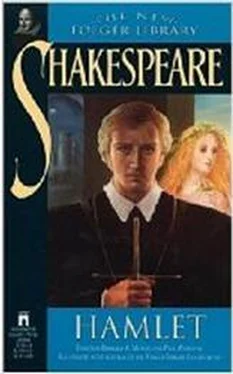
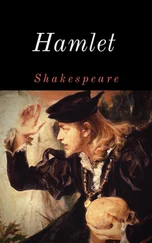
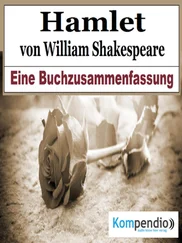
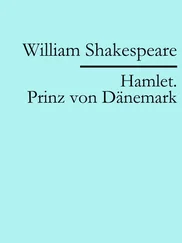


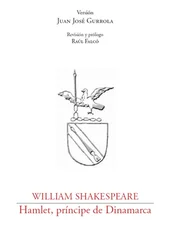



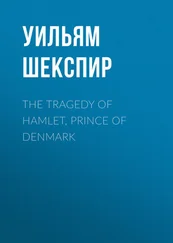
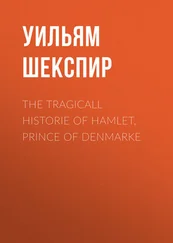
![Уильям Шекспир - The Works of William Shakespeare [Cambridge Edition] [Vol. 1 of 9]](/books/746589/uilyam-shekspir-the-works-of-william-shakespeare-c-thumb.webp)